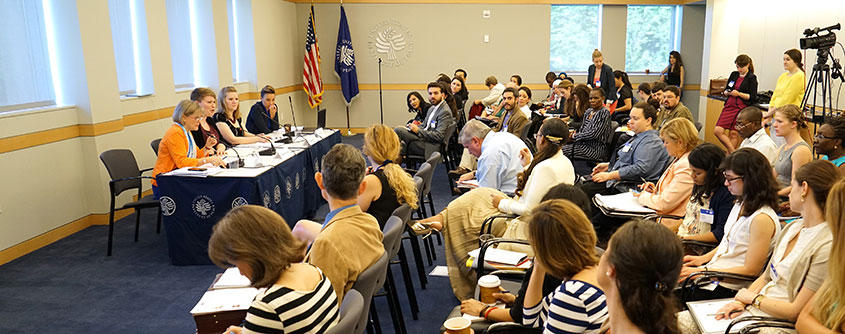Ending Sexual Violence in Conflict
Missing Peace Young Scholars’ Contributions to the UK Global Summit
Read the Event CoverageUSIP hosted a discussion on cutting-edge research initiatives to prevent and mitigate sexual violence in conflict and post-conflict settings.

The U.S. Institute of Peace (USIP), Women in International Security (WIIS), the Human Rights Center at University of California-Berkley and Peace Research Institute Oslo (PRIO) hosted the Missing Peace Initiative Young Scholars for a panel event on May 23, 2014 from 9:30 to 11:00am at USIP. The Young Scholars Network is an extension of the Missing Peace Initiative, and brings together a global community of scholars currently researching innovative methodologies to address the prevention of sexual violence in conflict.
In support of the British Government’s June 2014 Global Summit to End Sexual Violence in Conflict this event examined the current research initiatives to end sexual violence in conflict and offer important insights from pioneering studies conducted by members of the Missing Peace Young Scholars Network.
The panel offered an opportunity for international policy and academic communities to identify challenges and gaps in preventing and mitigating sexual and gender-based violence worldwide. The outcomes of the two-day workshop and public event were forwarded to the co-chairs of the London Summit, UK Foreign Secretary William Hague and Ms. Angelina Jolie, Special Envoy for the U.N. High Commissioner for Refugees.
Additional Resources
- Young Scholars Statement
Presented to the Co-Chairs of the UK Global Summit to End Sexual Violence in Conflict - Shortened statement featured on Huffington Post
- International Protocol on the Documentation and Investigation of Sexual Violence in Conflict
Further Readings
- Acting Time; Or, Ending Sexual Violence in Conflict by Paul Kirby
- Ignoring the Evidence at the End Sexual Violence in Conflict Summit by Amelia Hoover Green
- Does Size Matter? Reflections on the Ending Sexual Violence Summit by Chen Reis
This event featured the following speakers:
Members of the Young Scholars Network
- Renata Avelar Giannini
Research Associate, Igarapé Institute, Rio de Janeiro, Brazil - Amelia Hoover Green
Assistant Professor, Drexel University, Pennsylvania, USA - Sabrina Karim
Ph.D. Candidate, Emory University, Georgia, USA - Paul Kirby
Lecturer, University of Sussex, Brighton, UK - Jocelyn Kelly
Ph.D. Candidate, Johns Hopkins University, Maryland, USA - Michele Leiby
Assistant Professor, College of Wooster, Ohio, USA - Tia Palermo
Assistant Professor, Stony Brook University, New York, USA - Chen Reis
Clinical Associate Professor, University of Denver, Colorado, USA - Alexander Vu
Assistant Professor, Johns Hopkins University, Maryland, USA
Members of the Missing Peace Initiative Steering Committee
- Kathleen Kuehnast
Director, Center for Gender and Peacebuilding, USIP - Chantal de Jonge Oudraat
President, Women in International Security (WIIS) - Kim Thuy Seelinger
Director, Sexual Violence Program, Human Rights Center University of California-Berkeley - Inger Skjelsbæk
Deputy Director, Peace Research Institute Oslo (PRIO)



